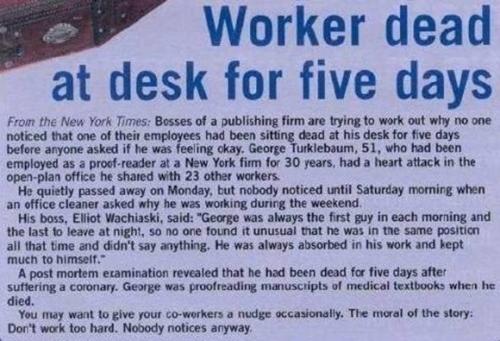Employment as contract
As time has gone on, our culture has changed to an adversarial one between employer and employee, where people are either “tools” who exhibit sycophantic self-abuse, or surly, grudging “workers” who secretly conspire against their consumerist capitalist feudal overlords.

In my view, the one good thing that came out of the dotcom boom — if for a moment we forget all the effete twee uselessness of web sites that calculate the length of toilet paper you’ll need based on what you ate — was the idea of viewing employment in a different sense:
- Employees are capable people specialized in something they like doing, so should be able to pursue their own interests in that field at work (Google).
- The office should have a culture that re-aligns people to what the company does well, and takes pride in that as much as profitability (Apple).
- The division between contractor and employee should be blurred with the recognition that employees who are not working to potential will get bored and move on (IBM).
- Offices should be open, clean, comfortable and convenient places to work where employee needs like daycare and flexible time are addressed (Microsoft).
I think this proposes a sensible basis for collaboration, which I see as more important than rights.
Workers rights, like any other rights-oriented activity, creates unnecessary polarization and bureaucracy by the very nature of pitting two absolute demands against each other: the market versus the rights of the worker.
“Rights” work when there’s no need to compete and there are endless resources to satisfy every need. But in the workplace, and the markets that control its success, this is not the case. If you relax and stop getting better at what you do, you’ve become one of those calcified fence-sitters that everyone loves to hate, pumping out the same product and taking home the profits.
Obviously, this varies with industries. You’re not going to find a way to make better pickled okra, most likely, or find a better way to cut lawns. But competition is part of nature because it’s a mathematically sensible design: one entity will lapse into solipsism and stop adapting, but if there’s two or more, they keep each other driven to do a good job and/or adapt in new ways. This type of design doesn’t require a “right answer” but provides infinite space for more right answers to successively get better at a task, without knowing what the optimal nature of that task is.
Similarly, not all workers are going to find themselves inclined toward this new relationship. Unskilled and semi-skilled laborers have no incentive to change toward this new arrangement because they are not as portable or specialized as others. However, they can benefit as well from a workplace which is not based on adversity, but collaboration.
With all the bloviation about the swine flu recently, employers have started to take a positive step — sending people who look sick home to work or, not to work, but in either case, stopping them from spreading the illness to everyone in the office. Others employers are allowing flexible time or four-day work weeks to save gasoline and carbon credits.
Viewing employment as a contract in which both partners are willing participants, and then giving up fighting as if working is a given, liberates us from resentment and allows the kind of workplace I describe above.
It’s possible we’ve gotten so decadent as a culture that we can only see ourselves as victims who must revenge ourselves upon our employers, but we can change this outlook for not only better function, but better mental health.









